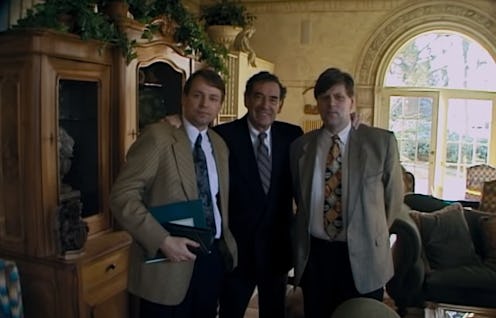Entertainment
Netflix's New Doc Is About A Secretive "Frat House For Jesus" With Major Political Ties
On August 9, Netflix will release a docuseries called The Family, which is another name for a secretive religious organization called The Fellowship Foundation. Netflix calls it a "enigmatic conservative Christian group" that has an 80-year long influential history with the U.S. and other governments. Its leadership owns multiple properties in the D.C. area where events and meetings are held, and some members live in Ivanwald, an Arlington house where "brothers" are groomed — kind of like a fraternity's pledge class, but with a theological twist.
Investigative journalist Jeff Sharlet lived there for a time and published a book about it with the same title, The Family, in 2008. According to his writing, its residents are often "well-connected young men from upper-middle-class or wealthy backgrounds with 'leadership potential.'" Recalling his visit, he described them as a diverse group that ranged from post-college-aged men looking for direction to foreign businessmen studying the organization's structure. On night one, he wrote that they prayed for God to "break" him.
The D.C. base of buildings — which includes the C Street Center, the alleged headquarters, and Potomac Point, a supposed group home for women — are collectively referred to as The Cedars on the foundation's official website. According to the site, The Cedars is "a place of peace and privacy, where trusted relationships are nurtured to encourage a leadership led by God," and it also "provides a place where young people learn the ways of servant leadership."
Contrarily, others have stated their uneasiness related to the foundation. According to a Washington Post report, in August 2003, one of Ivanwald's residents broke into a neighboring home and stole a bottle of prescription painkillers. The homeowner later found a letter in his mailbox from James Hammond, who admitted to the theft and promised to turn himself into Arlington police, which he did. The Post called him "a college dropout from Newport News, Va., [who] was five months out of drug rehab" when he moved into Ivanwald for a dose of religious detox.
The Post also reported that the surrounding neighborhood became divided into "Cedars people" and "non-Cedars people," the latter complaining of the property housing "transient and troubled young people without proper permits." Are these the same "well-connected young men" Sharlet wrote about?
According to the Post article, Merle L. Morgan, a Fellowship Foundation volunteer, had the following to say about Ivanwald and the men it houses: "People who have had fame and money and success usually have trouble with their children, and they send their children to us because they've tried other options and they haven't worked."
After the Hammond burglary, the foundation's president, Richard Carver, said that Fellowship leadership would better vet the list of Ivanwald entrees and that they would also obtain the obligatory housing permits. "We believe it's a very important program and one that has done worlds of good," he said. "We're not terribly interested in shutting down the program ... but we will comply with the law, period."
Since that 2003 statement, not much more information has been released in regard to improved housing programs and admission. In 2009, World magazine reported that the Ivanwald men "tend the grounds carrying leaf blowers." And some unconfirmed accounts of time spent there have been published online.
It's possible that The Family will provide a more solid background, but as Ivanwald exists on the internet right now, its workings sound like the beginnings of an episode of The Handmaid's Tale. Hopefully, that's not the case.
